Poverty, plastic surgery and a traffic offence that hit the headlines: Dr Woffles Wu goes On the Record
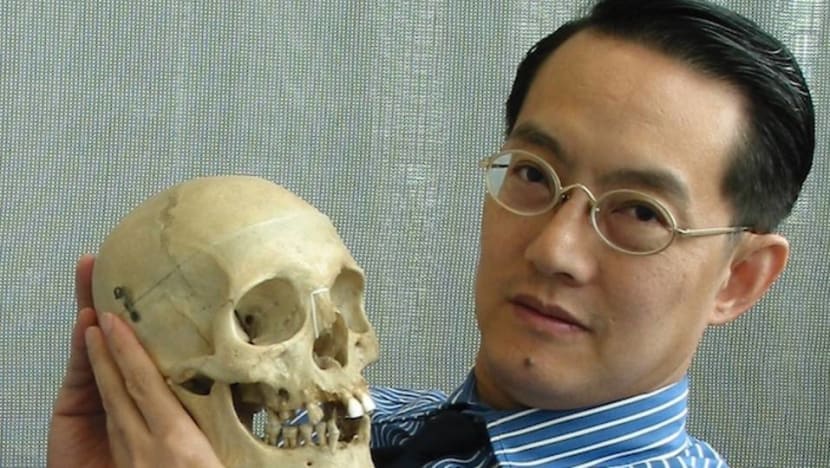
Prominent plastic surgeon Dr Woffles Wu has just released his memoir, "Life in Plastic". (Photo: Woffles Wu)
SINGAPORE: Dr Woffles Wu’s name often sparks vivid imagery of people undergoing nose jobs, face lifts, botox treatments and a whole range of aesthetic procedures. Indeed, it has become synonymous with plastic surgery, not just in Singapore, but around the world.
After all, the prominent Singaporean plastic surgeon invented a procedure named the Woffles Lift that is being used by surgeons everywhere. It’s a non-surgical procedure for face lifts which involves injecting self-retaining threads into the face and out through the scalp, eliminating the need for stitches and cutting recovery time from several weeks to just several days.
But Dr Wu is more than a plastic surgeon as he has proven over the years.
For instance, the flamboyant doctor who often used to be seen wearing garish multi-hued shirts, also co-produced a film- Singapore Dreaming - in 2006.
“It’s just to have a full life and to experience different things,” he says.
The 58-year old arrives for our interview in a nondescript white short-sleeved shirt, clearly mellower than the last time I met him. It’s “a function of age”, he says.
Throughout our conversation about his recently released memoir, Life in Plastic, and other issues, it’s clear that he has spent time processing pivotal events in his life including some painful ones.
From the challenges of his growing-up years, his relationship with his parents and his career challenges to the traffic offence that propelled him into the public eye for all the wrong reasons in 2010 - he speaks of these now with a calmness that reflects a comfortable acceptance.
To listen to the full interview, click here.
THE TRAFFIC OFFENCE SAGA – “I ACCEPT IT WAS WRONG”
While his memoir covers many of these events, one that is missing is the saga of how he got an elderly employee to take the rap for two speeding offences in 2005 and 2006.
The case only came to light in 2010. He was fined S$1,000 for it and in 2014, the Singapore Medical Council (SMC) suspended him from practice for four months, saying that with his “wrongful act”, he had “tarnished the good name of his profession”.
The case sparked public discussions over whether he was let off too easily and it was even raised in Parliament in the context of the equitability of the legal system.
I first ask Dr Wu why he left the incident, which he describes as harrowing, out of his memoir.
“The whole saga and why it’s not in the book, is because it’s just too long and convoluted. It would have consumed the book,” he says.
However, since I’ve asked, he agrees to discuss it with me and reveals information that he says was left out of news reports at the time.
“First of all, the elderly employee was my godfather. He was very close to my family and he was helping out in the clinic. He was my employee in that respect because I gave him a salary. But it’s not as if I abused my position and went to this elderly guy and said 'Hey, you got to take the rap for me'. It wasn’t anything like that at all.”
However, regardless of their relationship, why did he decide to get someone else to take responsibility for the speeding offences?
“I’ll make one disclaimer first. I accept that it was wrong and I shouldn’t have done it but in those days, a lot of people were doing it. It was just a traffic fine and putting a name on the traffic fine. I thought it was as trivial as jaywalking or one of those other things.
“I guess it was just ego. I had a completely clean record but there was this fine, and my godfather who was sitting with me as we were having lunch one day said 'Well, you can put my name for this'. So I said, 'Oh okay, that’s a good idea'. We were still going to pay the fine anyway. I didn’t think anyone was hard put by it and we just forgot about the incident.”
"IT WAS LIKE A HONG KONG DRAMA"
He suspects what brought it to the attention of the authorities a few years later were the actions of one his former employees, who he says was stealing from his practice.
He confronted her but she denied wrongdoing. Eventually he fired her and reported her to the police.
She was sent to jail but not before she “vowed vengeance”, he says.
“She said to me, 'I will one day see you in jail as well'. It was like a Hong Kong drama being unfolded before my eyes.”
She had witnessed the conversation between Dr Wu and his godfather about the traffic offence, he adds.
“She had written a couple of complaints to various agencies saying I had abused her and I had to write back lengthy letters saying that she has stolen money from us and she is currently under investigation, that she is currently in jail, and that these are fictitious complaints. So they were all thrown by the wayside but finally she went to the Corrupt Practices Investigation Bureau and she alleged that I had bribed this elderly employee.”
Dr Wu was subsequently investigated.
“It’s not fun being investigated by them. It’s exactly like what you see in the movies with little cell with a glass window and you’re sitting on the chair and somebody is interrogating you and your godfather is in the other room and you’re only allowed to look at each other briefly.
"It was quite harrowing but the good thing is, they discovered that there was no wrongdoing of that nature. No money had changed hands, but I readily admitted to the putting his name on the traffic offence, which I shouldn’t have done.”
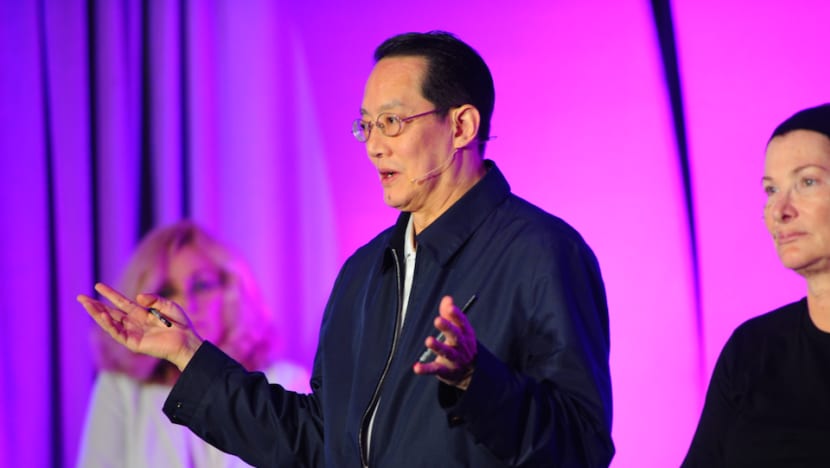
LET OFF TOO LIGHTLY?
Then came the public scrutiny.
Was the S$1,000 fine commensurate to his offence, people asked?
Was he being let off lightly because he was rich or because of his relationship with people in high places?
The Attorney-General's Chambers had to issue a statement explaining its decision to charge Dr Wu under a section of the Road Traffic Act rather than under the Penal Code, which provides for stiffer penalties.
Among the reasons for this was that Dr Wu could not have been charged under a section in the Penal Code for intentionally perverting the course of justice because he had committed his offence in 2006, before that particular section was enacted in 2008.
Also, as there was no major accident or injury, it was considered appropriate to proceed under the Road Traffic Act and in general, fines or short custodial sentences are imposed for wilfully providing false information.
The case was also discussed in Parliament. In response to questions, Law Minister Shanmugam cited six cases between 2004 and 2007, to show that the final result of Dr Wu's case was consistent with the verdict of the Court in those instances - where no jail term was imposed.
“A lot of people ploughed into it because it suddenly became fodder for the internet and people didn’t realise that the fine I was given was three times more than what it should’ve been for that period," says Dr Wu.
“All they could see was that 'Hey, he only got a fine and some other people went to jail'. They were not comparing apples with apples because the people who went to jail over traffic offences were also people who had bribed other people to take the rap for them. So there was an exchange of money, which there wasn’t in this case.”
He stayed away from the internet during that period because reading such reports was just “too distressing”.
Then came the SMC’s decision to suspend him for four months.
The SMC had said that he was unremorseful. I ask him why he came across that way.
“I didn’t even bother to put up a fight because I’d accepted it. What I did was wrong. They asked me why I did it and I said honestly that I didn’t think it was a serious thing at that time. I had seen other senior people doing it. Even some senior doctors have done it and we just thought it was a trivial thing.”
This explanation was construed as reflecting a lack of remorse.
Dr Wu however says he was merely explaining why he had done it without meaning to justify his wrongdoing.
I ask him why he never appealed the decision.
“It was something that was said to me during that process, that the public was outraged by my behaviour and justice had to be seen to be done. So I thought, okay, these are my peers, these are my seniors and if they say that this is not up to their moral yardstick, I accept that and I just wanted to be as quiet as possible.”
ACCEPT IT AND MOVE ON
During his four-month suspension, he says he concentrated on getting back to his life.
“I like playing squash and the World Squash Championship Masters was coming up, so I was training for it and I just put medicine out of my mind for a while. I was also doing a little bit of teaching. People who wanted to learn about plastic surgery would come to me and I would give them lectures.”
I wonder if he reflected on his actions and what had happened as a result.
“Of course, I have reflected. I knew it was a silly thing to do but I never thought a traffic offence would derail my career to such a great extent. You either accept it and move on or you dig a hole and jump inside and cry. I’m not about to do that because my philosophy in life is you only got one life, you’re not coming back, you better live it while you can.
“This incident also forced me to re-examine my relationship with people around me, who I value most. It drove home the point that your family is always there for you. The children and my wife are the beautiful things in my life.”
When I ask if the incident affected his business, he says it’s hard to tell as the industry was going through other changes at the time as well.
“That, together with unfavourable economic conditions at the time and the fact that people were becoming more budget-conscious and beginning to fly out of Singapore to do surgeries either in Bangkok or Malaysia, or Batam could have been the causes of the decline I saw in my business. Then there was this Korean wave of doctors coming into Singapore and setting up clinics, consulting with patients and then taking all the patients back to Korea to operate.
“I think all of us noticed a huge downturn in our practices and whether or not this incident contributed significantly to it, I can’t really evaluate in an honest fashion.”
But clearly, Dr Wu’s life encompasses much more than his traffic offence.
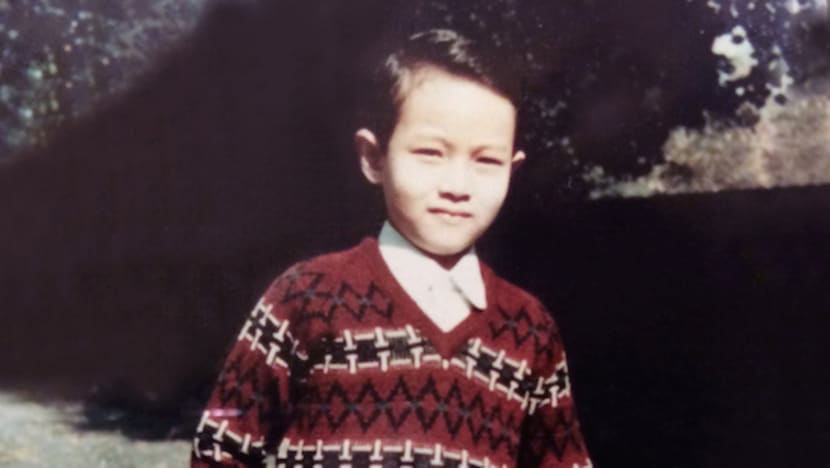
LIFE IN LONDON
We talk about the other facets of his life that he has shared in his book.
He writes a great deal about how his upbringing has shaped who he is today.
One pivotal moment was when at the age of 4, he left for London with his mother after his parents’ divorce.
She went there to pursue a law degree.
Life in London for them was not what many Singaporeans typically picture, he says.
“They think I was privileged or going to a boarding school. But it wasn’t like that for us. The two of us struggled for six years, in a foreign land, moving from one room to another room.
"It was a function of how much money we had. It was all being paid for by my grandfather who’s a policeman and you can imagine policeman didn’t earn that much in those days, so we just really had to get by on the cheapest available housing which was a room."
He recalls the living conditions with almost a sense of nostalgia.
“The way it worked in England in the 1960s was if you were renting a room, there’s no toilet with it. The toilet was outside on the landing. There was also no heating unless you put a coin into the machine. So there’s a little meter. You can see the meter ticking and you put in a couple of pennies and the heater comes on for a short while. In the cold of winter, you put a couple of pennies in, and when you’ve run out of pennies, you’ve just got to stay cold.”
His mother was determined to complete her studies in spite of the financial difficulties.
“I think my grandfather also really wanted her to continue her legal studies because he knew that she would be good at it and she was good at it.”
He says it was challenging but sometimes “fun”.
“When you’re living through it, it’s not as bad. There are moments. When you’re trying to get a bath and you finally do get a bath, even though it’s in a public toilet, it’s still a bath and you’re still quite thankful for it. I guess that helped to hone the kind of resilience that I hope I’ve displayed through my life.
"Maybe I’ve got a nomad in me, but we would pack everything up and move to a new place and it was always kind of exciting for me to see whether this new place was better than the old place, making new friends in the neighbourhood and going to a new school."
However, the racism and xenophobia he experienced were not so pleasant.
Some of the people he encountered asked if Singaporeans lived in trees with the monkeys and whether his parents wore leaves for clothes.
His London experience also contributed to the unusual name Woffles sticking with him throughout his life.
Prior to that, his mother who “had a thing for cute little names” had nicknamed him that, after a rabbit from the novel The Magic Faraway Tree by Enid Blyton.
In school in London, nobody could pronounce his Chinese name, Tze Liang. So he told them to go with his nickname.
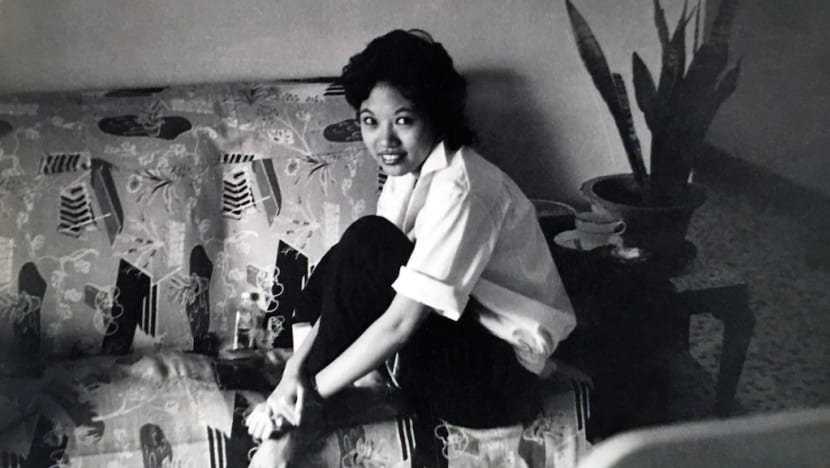
HIS RELATIONSHIP WITH HIS PARENTS
Much of his childhood was spent hoping his parents would get back together.
“For a brief period when we came back to Singapore and had been visited by my father a couple of times, I used to see that they got on pretty well. They could still laugh at each other and they could still crack jokes with each other so I was hoping that maybe they would rekindle something. But it didn’t happen.”
His father would visit, but every time he left, it was “heartbreaking”, says Dr Wu.
While he longed for life with a father, some things about his dad bothered him.
“One of the main problems with my father and our relationship at that time was that whenever he spoke to me, or called me on the phone or even came down to visit us in our house in Singapore, he was always drunk. If you’ve ever experienced trying to have a conversation with somebody who’s really off his rocker, it’s very frustrating.”
He assures me that his father, who was an airline pilot at the time, was not an alcoholic, but merely enjoyed drinking while he was off-duty.
His father remarried and had more children with his second wife. When he died, he left an equal share of his estate to Dr Wu, something that made him realise that his father indeed thought of him as one his children even though they had been largely apart.
One of his enduring regrets is judging his father too harshly.
"Now as an adult and being married, I realise the difficulty of maintaining a relationship with one person over many, many years. I can begin the understand how different my parents were as personalities. My mother probably had one set of expectations which he couldn’t fulfil and he probably had another image of her."
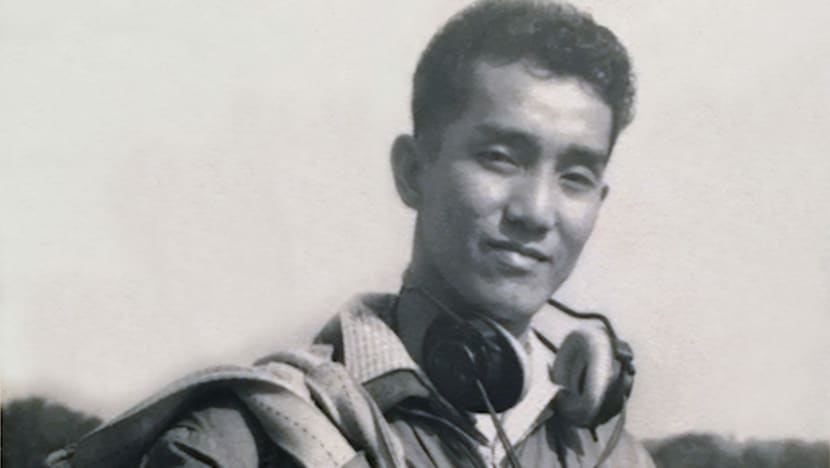
WHY PLASTIC SURGERY?
Aside from family, naturally, his medical career is a vital part of his story.
Many of his aunts and uncles were doctors and their influence attracted him to the profession, however plastic surgery stood out for him for very specific reasons.
“I’m naturally a creative person and in my life, I love art and I paint as well. I realised that I had to come back to the creative aspect. I knew I didn’t want to be just sitting there, make a diagnosis and give medicine, then wait for it to work. I wanted to do something with my hands. So it meant something surgical and since I have a natural eye for beauty, it just became second nature to me.”
Like many plastic surgeons, he started off in reconstructive surgery.
“That’s a huge branch and all of us trained as reconstructive surgeons. Whether we treat burns or treat cancers, breast cancers, cleft lips, all of these fall under plastic surgery. If you’re restoring a patient to normality, you have to do it with an aesthetic eye. But this is where you learn all your skills.”
He acknowledges of course that aesthetic surgery - “making somebody who’s already normal, look better for whatever reason, either to look younger or to physically look better” - is a different ball game.
When I put it to him that plastic surgeons are merely capitalising on people’s insecurities, he says he sees it differently.
“We are all, to a certain extent, insecure about something in ourselves. What have we turned to in the past to address this? Make-up, hairstyle, fashion. So now, you have the ability through medical science, to change certain features in your face, to give you that self-confidence that you were looking for and I think that makes a huge difference in peoples’ lives.
"We have to understand that looks aren’t important to everybody. But they are important to certain people. We have to be understanding of different peoples needs and we can't use one yardstick for everybody."
However, he does draw a line in certain cases.
“People with body dysmorphic disorder obviously need psychological help. I don’t do surgery or cosmetic procedure on everybody who walks in my door. Some people have a lack of self-confidence when actually there’s no reason to because their face looks perfectly all right If I feel that this is not going to benefit you aesthetically, or if the risk of getting there is too high, I will dissuade you from doing it.”
He also encourages moving away from subscribing to specific ideals of beauty.
“Many people used to think that there is an ideal face for everybody in the world and one of the movements that I’ve been a part of in the last 15 to 20 years has been to tell people that we are all beautiful in our own way and we shouldn’t be judged by just strictly a Caucasian standards.
“I try to keep my beauty parameters within each ethnic group. So if you look at the Chinese or you look at the Indians, there are really, really gorgeous Chinese, Indian and Malay faces and then there are the others which look a little flatter or a little broader or not so attractive and I try to move people up the aesthetic scale for that ethnicity. I’m not into making an Asian look like a Caucasian. I think that’s going over the limit.”
As a doctor, he has had a few lawsuits brought against him by patients in the last few years.
He puts it down to unrealistic expectations in spite of the fact that he goes through “a full list of complications” and even shows patients “pictures of complications”.
“If somebody is doing a breast reduction, I will show them a picture of a breast where somebody’s nipple has died or where the wound has split open and I’ll tell them that this is a potential complication that you could encounter. Do you still want to go ahead with the surgery? And then you begin to determine how firm they are in their minds about having a certain procedure.
“Some think that a plastic surgeon is a god-like person who can just wave a magic wand and they will look exactly the way they want. However, plastic surgery is a science and it’s a surgical science which means that no two individuals are going to heal in the same way, no two individuals will have swelling in the same way. Everybody looks a little different.”
In 2014, a patient sued him for negligence, claiming she was persuaded to undergo facial treatment that resulted in pain, suffering and complications.
“What transpired was that she had been to see other doctors previously and she had these creams from them. She was applying them inappropriately with the creams that we had given her. So she basically burnt her face. It went to court and was thrown out.”
But such news, he admits, has affected business.
"This is where being positive about your life helps you to cope with these things. At one point of my career, I had probably 30 or 40 patients in my clinic every day. Now there are far fewer patients. But I don’t allow it to bother me. I look at it as a blessing because it now means I have more time to do other things in my life, especially being with family, or doing the things that I love like playing squash. So I’m not hung up about sitting in the clinic."
He himself has not undergone any major aesthetic procedures and has no intentions to in the near future.
“I’ve had a little bit of botox to my forehead because I have a very wrinkly forehead but that’s about the only thing I’ve done. I do maybe a skin freshening once a year. I’m a very happy-go-lucky kind of person. So I wanted a countenance that goes with that.
“As you age, things happen to you, and you can absolutely accept it gracefully. I play a lot of sports. I think sports helps the overall rejuvenation of the body. But sometimes, if you’re developing pigmentation for example, if you’re getting a big black spot on your face which just kind of makes you look not optimal, then there’s no harm in doing a bit of a laser or a bit of IPL just to get rid of it.”
Aside from the art and the science, he has concerns about the business of plastic surgery.
As more go overseas for more affordable aesthetic procedures, he feels more needs to be done to level the playing field for doctors operating in Singapore.
“Currently, aesthetic doctors in Singapore are not even allowed to put a before and after photograph on our website. It’s considered ethically wrong and when we asked why, the SMC said it’s laudatory. How is patient education illustrated by a photograph of a person without double eyelids and then another of what they look like with double eyelids, laudatory? It is just educating the public as to what they can expect. Patients or potential patients are only going to click on a website that has pictures and since everywhere else in this region doctors are allowed to freely advertise before and after pictures, patients end up going to these doctors.”
He admits however that doing such procedures in Singapore is definitely more expensive than in other countries.
“But I think the overall standard of aesthetic surgery here is very high. I mean it’s comparable to some of the best cities in America or in London, Paris. I don’t think we lose out to many other people.”
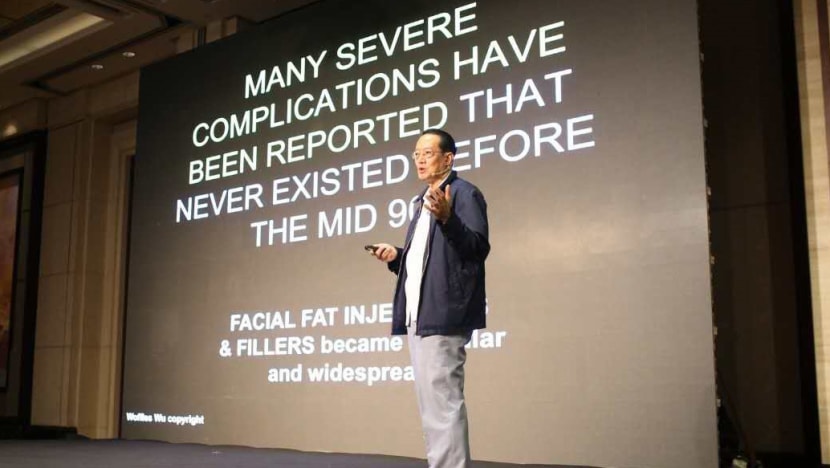
RETURNING TO HIS ROOTS
He hopes to soon return to his roots doing reconstructive and corrective surgery.
He recently got a license to practice in China and is looking into doing pro bono work there.
"Treating reconstructive patients and treating patients who are not necessarily coming to you just to look even better. That gives me a sense of satisfaction and in recent years as I’ve gone back to China more often to do these operations that I used to do before, it’s brought back that feeling of satisfaction, gratitude and reminded me why I went into medicine in the first place. It’s given me a modicum of satisfaction that is missing when you’re just treating cosmetic patients.”
Writing his book has also reignited a love for the arts.
He is working on two film projects for which he is writing screenplays. One is about an elderly lorry driver who loses his wife and as a result, his will to live. His friends introduce him to a woman from China and hence begins an exploration of stereotypes in modern Singapore society.
The other film is about an obsessive toy collector.
Both projects have been in making for many years. He says they were put on hold because the problems he faced over the traffic offence saga wrecked his peace of mind for several years. Today, it seems he is determined to put that behind him.
“I try to live life as fully as I can now and I know we have setbacks. We’ve got speed bumps along the way. We have to drive over or navigate them. The traffic incident was one. There will be many more. If you’re going to dwell on them and just be morose and mope about things, it doesn’t help things very much so I try to be very positive, even in the face of adversities.”












